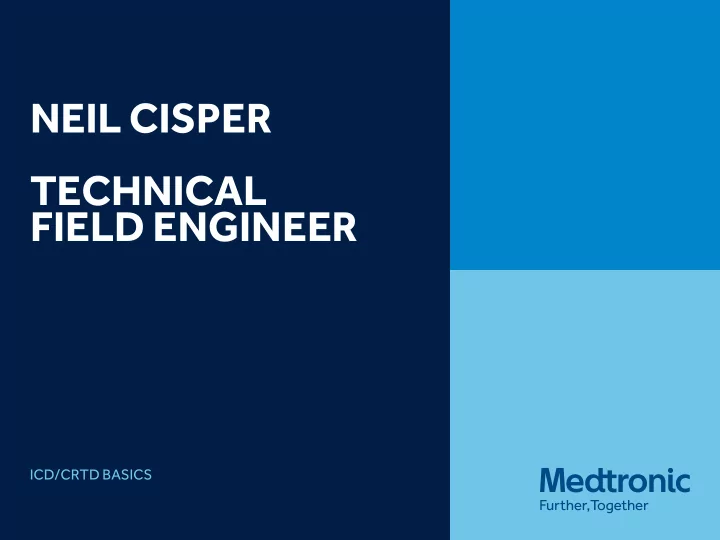

NEIL CISPER TECHNICAL FIELD ENGINEER ICD/CRTD BASICS
OBJECTIVES Discuss history of ICDs Review the indications for ICD and CRT therapy Describe basic lead and device technology Discuss different therapies for ICDs Display different fluoroscopy views of devices Go through patient’s FAQ 2 ICD/CRTD Basics | September 30, 2016
ICD HISTORY Dr. Paul Zoll (1911-1999) Zoll, NEJM 1956 First human transthoracic defibrillation 3 ICD/CRTD Basics | September 30, 2016
HISTORY OF ICD THERAPY 1966 Device conception 1969 First experimental model 1976 First animal implant 1980 First human implant 1982 Addition of cardioverting capability 1985 FDA approval 4 ICD/CRTD Basics | September 30, 2016
HISTORY OF ICD THERAPY 1988 First programmable device approved 1991 Model with tiered therapy and single-chamber back-up pacing approved 1993 First endocardial defibrillation lead approved 1995 First pectoral implants 1997 Addition of atrial rhythm discrimination and backup dual- chamber pacing approved 2002 Model with cardiac resynchronization for CHF approved 6 ICD/CRTD Basics | September 30, 2016
ICD INDICATIONS
DISEASE STATES DEFIBRILLATORS Tachycardia Defibrillators treat _____ heart rates or ___________ Fast Sudden Cardiac Death Prevent _____________________ Patients who are more prone to have a cardiac arrest - Primary ________ Prevention Secondary Patients who have had prior cardiac arrest – ___________ Prevention 8 ICD/CRTD Basics | September 30, 2016
INDICATIONS FOR ICD – CLASS 1 1. Cardiac Arrest Due to VT or VF Not due to transient or reversible cause 2. Spontaneous sustained VT Structural heart disease must be present 3. Syncope of undetermined origin with: Sustained VT that has clinical relevance and/or hemodynamic significance VF induced during EP study when drug therapy to sustained VT is not preferred 9 ICD/CRTD Basics | September 30, 2016
INDICATIONS FOR ICD – CLASS 1 4. Non-sustained VT with: Coronary disease Prior MI LV Dysfunction Inducible VF or sustained VT (Non-suppressible by antiarrhythmic drugs) 5. Spontaneous sustained VT Not amenable to other treatments 10 ICD/CRTD Basics | September 30, 2016
SPONTANEOUS VENTRICULAR FIBRILLATION 11 ICD/CRTD Basics | September 30, 2016
SPONTANEOUS VENTRICULAR TACHYCARDIA 12 ICD/CRTD Basics | September 30, 2016
SPONTANEOUS FAST VENTRICULAR TACHYCARDIA 13 ICD/CRTD Basics | September 30, 2016
CRT INDICATIONS ICD/CRTD | September 30, 2016
CRT = BIVENTRICULAR (BIVS) A CRT device sends small, undetectable electrical impulses to both lower Right Atrial chambers of the heart to help Lead them beat together in a more synchronized pattern. This Left Ventricular improves the heart's ability to Lead pump blood and oxygen to the body. Right Ventricular Indication is for patients who Lead have ____________ and Heart Failure Ventricular ____________ Dysfunction 15 ICD/CRTD Basics | September 30, 2016
CRT DEFINITIONS What Causes Ventricular Dysynchrony? 1 Disruption of myocardial collagen matrix impairing electrical conduction and mechanical efficiency Intraventricular conduction delays usually manifested as left bundle branch block Regional wall motion abnormalities with increased workload and stress — compromising ventricular mechanics What is Cardiac Resynchronization Therapy? Cardiac resynchronization therapy works by sending electrical signals to the right and left ventricles of the heart so they contract together (resynchronize). By improving the pumping action of the heart, there may be an improvement in heart failure symptoms. 1. Tavazzi L. Eur Heart J 2000;21:1211-1214 16 ICD/CRTD Basics | September 30, 2016
DEVICE COMPONENTS ICD/CRTD Basics | September 30, 2016
PACEMAKERS AND ICDS Defibrillators All ______________ are ___________, not Pacemakers all___________ are Pacemakers ___________ Defibrillators 18 Evolution of PPMs and ICDs | April 16, 2016 |
FUNCTIONS OF AN ICD Senses 1. _______ appropriate cardiac signals Detects 2. ________dangerous rhythms Therapy 3. Provide _________ for Ventricular Tachycardia and Ventricular Fibrillation 4. ______ if necessary Paces 19 ICD/CRTD Basics | September 30, 2016
IMPLANTABLE CARDIAC DEVICES Pacemakers Heart Failure Devices CRT-Pacemaker Defibrillators CRT-Defibrillator
IMPLANTABLE LEADS Pacemaker LV Leads (CRT) Leads Defibrillator Leads
DEFIBRILLATOR LEAD SELECTION Single or Dual Coil Active or Passive fixation DF1/IS1 or DF4 connector Multiple options for each patient
DETECTION Pacemaker Basics |
DETECTION What does “Detection” mean? A device defined arrhythmia is present based on what is Rate Duration sensed as determined by ______ and ____________ criteria. Based on multiple criteria Rate ____________ Duration ____________ 24 ICD/CRTD Basics | September 30, 2016
DETECTION RATE 25 ICD/CRTD Basics | September 30, 2016
ICD THERAPY
ICD THERAPIES TYPES ICD Therapy High Power (Shock Therapies) Cardioversion _____________ Defibrillation _____________ Low Power (Pacing Therapies) Anti-tachycardia Pacing (ATP) __________________________ Bradyarrhythmia Pacing ______________________ 27 ICD/CRTD Basics | September 30, 2016
ICD THERAPIES ANTI-TACHYCARDIA PACING (ATP) Pacing pulses delivered at a rate faster than the rhythm detected Can successfully terminate re-entrant tachycardias “Speed up the heart to slow it down” 28 ICD/CRTD Basics | September 30, 2016
ICD THERAPIES ATP Subsequent Pulse: Re-entry initiated ATP delivered at a rate faster Wavefronts collide than tachyarrhythmia. closer to re-entry circuit Wavefronts collide. Subsequent Arrhythmia Pulses: Wavefronts terminated collide even closer to re-entry circuit 29 ICD/CRTD Basics | September 30, 2016
FLUOROSCOPY
FLUOROSCOPY IMAGES Pacemakers
FLUOROSCOPY IMAGES Pacemakers
FLUOROSCOPY IMAGES Defibrillators
FLUOROSCOPY IMAGES CRT – HF – BiV Devices
FLUOROSCOPY IMAGES CRT – HF – BiV Devices
REMOTE FOLLOW-UP
REMOTE FOLLOW-UP CareLink Monitor Old Monitor
REMOTE FOLLOW-UP MyCareLink Smart MyCareLink
REMOTE FOLLOW-UP Patient Instructions Take monitor home ICD/CRTD Patients Plug into the wall next to wear you sleep at night Each night it will monitor your device and transmit if necessary Pacemaker Patients Store monitor Clinic will schedule transmissions On the day of the scheduled transmissions, plug in device and follow the screen prompts
FAQS Do you have any common patient questions? Longevity??
Recommend
More recommend